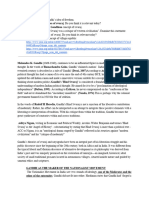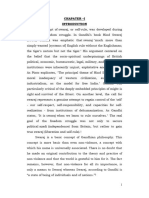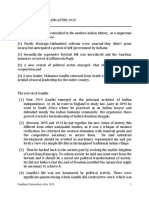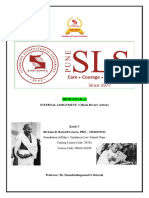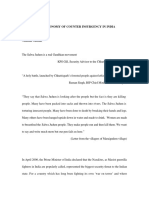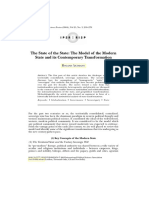Veeravalli - Swaraj and Sovereignty
Uploaded by
lucasandinoVeeravalli - Swaraj and Sovereignty
Uploaded by
lucasandinoSwaraj and Sovereignty
Author(s): ANURADHA VEERAVALLI
Source: Economic and Political Weekly , JANUARY 29-FEBRUARY 4, 2011, Vol. 46, No. 5
(JANUARY 29-FEBRUARY 4, 2011), pp. 65-69
Published by: Economic and Political Weekly
Stable URL: https://www.jstor.org/stable/27918091
JSTOR is a not-for-profit service that helps scholars, researchers, and students discover, use, and build upon a wide
range of content in a trusted digital archive. We use information technology and tools to increase productivity and
facilitate new forms of scholarship. For more information about JSTOR, please contact support@jstor.org.
Your use of the JSTOR archive indicates your acceptance of the Terms & Conditions of Use, available at
https://about.jstor.org/terms
Economic and Political Weekly is collaborating with JSTOR to digitize, preserve and extend
access to Economic and Political Weekly
This content downloaded from
192.188.53.100 on Sun, 02 Jan 2022 18:25:09 UTC
All use subject to https://about.jstor.org/terms
SPECIAL ARTICLE
Swaraj and Sovereignty
ANURADHA VEERAVALLI
Gandhi's understanding of swaraj in thought and It has been acknowledged that few in the history of civilisa
practice is a systematic response to the definition of tions have had the moral strength to stand up against and
offer resistance to a so-called, legally constituted, yet unjust
sovereignty in post-enlightenment political theory. The
regime of the state. Those like Gandhi and Martin Luther King
concept of swaraj does not merely address the question are seen as unique men of great moral, even spiritual strength,
of self-rule versus foreign rule or state rule versus and perhaps, strategy and charisma, who managed to not only
offer non-violent resistance but command mass support in their
anarchy, rather it questions the very presuppositions of
fight against the hegemony and unjust laws of a state. There is
sovereignty as constituted in the modern nation state.
interest in the story of their resistance, the particular methods of
In that way Gandhi not only presents a fundamentally resistance, such as non-violence or satyagraha (literally "truth
different theory of the relation between civil society and force" whose political form was non-violent civil disobedience).
the state but also of the two constitutive principles of As in Gandhi's case, the story needs telling for its sheer intrinsic
value, and for the light it throws upon the human condition and
modern theories of sovereignty - supreme authority
its possibilities. However, there has hardly been any appraisal of
and territory. these leaders' contribution to political theory. In fact, it would not
be far from the truth to say that most believe that there is no such
contribution or at least, that there is no systematic contribution.
Systematic Intervention
The contribution of Gandhi's thought to the Hindu tradition and
its reform (Parekh 1999), to a critique of modernity and modern
civilisation (Parel 1992), to non-violent action/resistance (Dalton
1995), to nationalist discourse (Chatterjee 1993), has been well
and variously covered. However, it is an appraisal of the contribu
tion made to the theory of a given discipline that allows one to
judge the systematic nature of an intervention in the history of
ideas. This essay addresses itself to this question and argues that
Gandhi's understanding of swaraj (or what he called self-rule) of
fers a fundamental and systematic critique of an alternative to
the theory of sovereignty in modern political thought, and in the
context of the modern nation state. For Gandhi, swaraj raised the
question of independence from British rule to a question about
the very understanding and definition of sovereignty. It was not,
as is believed by many, a matter simply of spiritualising politics.
He addressed not merely the question "who has the authority t?
rule?" but the question - "who has the supreme authority to
rule?". Therefore, the answer for him was not a simple matter of
self-rule versus foreign rule, or state rule versus anarchy, nor was
it a matter of renunciation of the world of politics, for the moral.
He was, in his response, presenting the possibility of a different
theory of sovereignty with fundamentally different presupposi
tions about the relation between civil society and the state.
The author is grateful to Ashis Nandy for commenting on an earlier A brief appraisal of the presuppositions and roots of sovereignty
version of this paper and in sharpening the focus of some of the
in the modern nation state will serve to show the significance of
arguments.
Gandhi's intervention: how he targets crucial and constitutive
Anuradha Veeravalli {gombiy@gmail.com) teaches in the Department of presuppositions of the prevalent definition of sovereignty within the
Philosophy, University of Delhi.
framework of the modern nation state and how his understanding
Economic & Political weekly JANUARY 29, 2011 VOL XLVI NO 5 65
This content downloaded from
192.188.53.100 on Sun, 02 Jan 2022 18:25:09 UTC
All use subject to https://about.jstor.org/terms
of swaraj strikes at the root of these presuppositions. Post-enlighten Similarly, though Hobbes is in favour of the Leviathan, or pow
ment theories of sovereignty are more or less agreed on its defini erful state, he says:
tion as that which has "supreme authority within a territory".
But the rights, and consequences of Sovereignty, are the same in both.
Thus supreme/exclusive authority and territory are the two con [Sovereignty by dominion, and by institution]. His power cannot,
stitutive principles of sovereignty in the modern nation state. without his consent, be transferred to another: He cannot forfeit it: He
cannot be accused by any of his subjects, of injury: He cannot be pun
The Social Contract ished by them: He is judge of what is necessary for peace; and judge of
doctrin?s: He is sole legislator; and supreme judge of controversies;
Theories of sovereignty in the liberal tradition, having their basis
and of the times, and occasions of war and peace... (Hobbes 1985:252).
in the social contract, are divided only in the emphasis they lay on
civil society (in the lineage of Jean Jacques Rousseau's general Here, Rousseau makes the point that there is no contradiction,
will theory) as a source of this authority, or on the state (in the or even possibility of contradiction, between the state and the
lineage of Thomas Hobbes' Leviathan) as its source. More recently, people. The state can never injure its people. Hobbes makes the
Agamben (2005) argues that states using the political and juridical reciprocal point that the people cannot injure the state nor accuse
impasse that allows the state to suspend the law and curtail the the state of injuring them because it is supreme judge of all that is
freedom of the individual/society in case of an emergency or good or bad for them. It is their conscience. In collapsing the
security threat, are fast becoming the rule rather than the exception. distinction between society, the citizen, and the state, only the
Further, according to him, there is no theory of the state of exception private individual, and everything that is private to him, religion,
and it is explained as founded in a state of necessity, i e, expedien conscience, calling, all which by definition does not belong to the
cies of a state of siege, or a political emergency. Agamben argues state or its society, can be in conflict with it. And this individual,
that the reason for the inability to constitute a theory that would and all that is private to him within the framework of the modern
explain the juridical status of the state of exception rests pre nation state - ideology, religion and conscience, necessarily
cisely in the fact that the state of necessity is itself presumed to be represent the dark possibilities of the state of nature unless they
the origin or basis of the law. On the other hand, limits on the cohere with, and are subject to, the common set of values that are
freedom and individual rights of persons are recognised as a agreed upon in the social contract. He cannot be sovereign nor can
necessity since stability is seen as a value in the liberal democratic he have a conscience except one that coincides with citizenship
framework. So, differences must cohere within a common system and the state. Therefore only a citizen as subject of the state can
of values agreed upon by rational members entering into a social have a conscience. In this, the state's definition of its sovereignty
contract, or under a given constitutional framework (Rawls is the rnirror image of the orthodoxy of established religion and they
2005). Nozick (1974) goes further, and argues that it would well are in crucial instances to be seen in complete conjunction in their
be within reason to coerce the few who may not consent to the disapproval of the voice of conscience, civil society and custom.1
principles of the social contract, to follow the will of the majority. Ironically, then, the individual is either the subject of the state,
The concern about the limit of sovereignty from the vantage as citizen, or its sovereign, as member and official of the state.
Thus sovereignty, within the framework of the social contract
point of society, or of the state, is only a matter of emphasis how
ever, since their origin and underlying presuppositions are one theories, presupposes not only a state of man's alienation from
and the same in modern political theory. Both ends of this spec himself, his nature, but also that of the collective/civil society
trum presume (1) that society is an artificial construct of individ from its nature. Some have characterised this as a consequence
uals under the social contract; (2) that existence of the state is of a contradiction in modern liberal states that separate the pri
inevitable and necessary; and finally (3) that civil society and the vate sphere where individual freedom is guaranteed, from the
state come into being simultaneously and are in fact two faces of public sphere, where it is curtailed.
the same thing. This fact also becomes at once the rational basis However, the real contradiction arises from the collapse of the
for the sovereignty of the state being unquestionable, just as it distinction between civil society and the state in post-enlightenment
becomes the basis of the need to limit the rights of individuals. In political theory, and not from the public-private dichotomy that
this way the very constitution of sovereignty limits the possibility rests on the dualism and conflict of the individual and the col
of the dialectic of state and society, since they are at source one lective. There is room only for two players within modern
and each is constitutive of the other. This is evident from the con political theory - the state and the individual. Proof of this lies, for
clusions of both Rousseau and Hobbes who, along with John instance, in statutory law which recognises only criminal and civil
Locke, can be characterised as founders of the social contract cases, the former, involving the state versus the individual, and the
theories in modern times. Though Rousseau emphasises the im latter, cases of individual versus individual. Civil society is not in
portance of the general-will of the people, and therefore of civil the picture either as voice of the individual or of the collective. In
society, he says: addition, there is a persistent effort to bring civil law under the
Further, the Sovereign, being formed only of the individuals who com purview of criminal law in consonance with the need to collapse
pose it, neither has, nor can have, any interest contrary to theirs; con the distinction between civil society and the state. Common law as
sequently, the sovereign power need give no guarantee to its subjects,
a vestige of pre-enlightenment systems of justice and governance is
because it is impossible that the body should seek to injure all its mem
the last bastion of a civil society that is not identified with the state.
bers; and we shall see presently that it can do no injury to any individ
ual in particular. The Sovereign, by its nature, is always everything it The public interest litigation (pil) can be seen as a new avatar of
ought to be (Rousseau 1947:17). common law, and modern India's unique contribution in the attempt
66 January 29, 2011 vol XLVi no 5 GEES Economic & Political weekly
This content downloaded from
192.188.53.100 on Sun, 02 Jan 2022 18:25:09 UTC
All use subject to https://about.jstor.org/terms
to break the overlap of state and civil society in the modern nation failed to bring the error home to the lawgiver by way of petitions and
state. In 1980, after a period of national Emergency, the Indian the like, the only remedy open to you, if you do not wish to submit to
error, is to compel him by physical force or by suffering in your own
judiciary put this law in place, by which the judiciary or any indi
person by inviting the penalty for the breach of the law. Hence Satyag
vidual (not necessarily being an affected party) can initiate litiga raha largely appears to the public as Civil Disobedience or Civil Resist
tion against the state/government in the public interest. ance. It is civil in the sense that it is not criminal (Gandhi 1969:179).
Sovereignty and Territoriality If one were to think that he said this only incidentally, he
This understanding of sovereignty in conjunction with the condition makes himself clear again when he says: "Civil Disobedience is
of territoriality then separates one nation state from another. Each civil breach of unmoral statutory enactments" (Gandhi 1969:181).
with its secure territorial boundaries is an independent sovereignty, In the first instance Gandhi rejects the dualism of the individual
with independent aspirations of freedom, and defence mechanisms. and the collective, since in civil society, the real issue is of the ne
Thus each state takes on the nature of an individual and the condi gotiation of self and other whether that other is god/truth, man,
tions of individuals in the state of nature are replayed with respect or nature. In the second instance, he implicitly rejects the dualism
to the relations between nation states until another contract comes of the private and the public and emphasises instead the personal
into being in the creation of a system of sovereign states. The world and the political spheres, the first involving the vindication of
wars witnessed in the past century re-enacted the possibilities of truth or justice between individuals, and the second between the
the state of nature on the international stage. The un and its council people and the state. In the latter case, he clearly overturns the
would have to follow the trajectory of the limits of sovereignty be classification of law in the modern nation state: A case of indi
tween state and society that we have discussed above: the state and vidual versus the state is necessarily representative of a case of
its methods of law and order would prevail over that of civil society. civil society against the state and is a civil, not a criminal case. By
The territoriality condition of the sovereignty theory presup implication, a case is criminal only when there is a threat to civil
poses that the jurisdiction of a state and nation overlap, just as it society by the use of violence, or divisive forces between individu
presupposes that the person and citizen and civil society and the als and between groups of individuals, but this is best negotiated
state, are coextensive. That this understanding has always been by civil society itself, and with least state intervention. This will
contested is seen from the fact that border disputes abound in the become clear from the examples discussed later in the paper.
world, where ethnic communities contest existing territorial
boundaries of the state, and its sovereignty. Gandhi's Theory of Sovereignty
It is within this context of the ultimate collapse, in political The theory of sovereignty proposed by Gandhi is based on the clear
theory and practice, of the distinction between state and civil separation of origin, constitution, and methods of the state from
society, both conceptually and territorially in the post-enlighten that of civil society. Thus it is not surprising that Gandhi bases his
ment discourse on sovereignty, that Gandhi's discourse on swaraj understanding of swaraj or, as he translates it, self-rule, on three
intervenes. Some have argued on the other hand, that it is indeed presuppositions fundamentally different from the accepted defini
the dualism of individual and collective, private and public tions of sovereignty in the modern nation state: (1) it presupposed
spheres,2 and the secular and the religious that Gandhi mediates the necessary differentiation and separation of civil society from
(Nandy 2000). However, the dualisms that constitute the modern the state, in their origin and constitution. (2) The possibility of self
nation state are not the premise on which the vocabulary of reform, rather than control over, or freedom from the other was
Gandhi's satyagraha and swaraj stand. He, as it were, systemati seen as a necessary condition of sovereignty. (3) It disposed of ter
cally disbands the presuppositions of the modern state and its ritory as a definitional condition of sovereignty; rather sovereignty
laws. First, non-violence is not a personal or private virtue but defined the relation/frontier (not boundaries) between territories
"Non-violence is the Law of our Species, as Violence is the Law of of different nations, and of self and other. Territory was neither an
the Brute" (Gandhi 1969:156). It is not the religion of the recluse but object of control, nor of acquisition or exploitation. The good of the
of the common people. Thus he sets aside the dualism of human/ self, or one's country rested in the good of the neighbour.
individual and the collective/society in the state of nature of the This understanding of swaraj as presenting a theory of sover
social contract. It is for him a matter of common people/civil society eignty allows us to see a unity of method and thought in Gandhi's
versus the state. Second then, the satyagrahi is conceived as a approach to several issues that pertain to the political, and the
foot-soldier of non-violent opposition to all aggression or use of political economy. To begin with, one can understand why it was
power, whether by oneself or the opponent, in the cause of the not imperative for Gandhi that the British leave India for the country
vindication of truth or justice. The satyagrahi shall neither be to be free. It was only a matter of last resort, when the impossibility of
subject to the law of the state, nor be party to its execution, as any attempt at self-determination, not of the state, but of civil
member of the state. On the other hand, Gandhi constitutes the society, vis-?-vis crucial issues concerning moden?ty/"civilisation'',
personal (not "private") and the political (not "public") spheres as Hindu-Muslim relations, and the problem of untouchability
merely two types of reasons for which satyagraha may be offered: became evident, that Gandhi called for purna swaraj (complete
self-rule). It was the impediment to self-reform that the British
So the doctrine came to mean vindication of truth not by infliction of
posed, the inability to set one's own house in order, that was crucial
suffering on the opponent but on one's self.
But on the political field the struggle on behalf of the people mostly since without self-reform independence would just be a matter of
consists in opposing error in the shape of unjust laws. When you have form and not substance. Their insistence on remaining within
Economic & Political weekly EBBQ January 29, 2011 vol xlvi no 5 67
This content downloaded from
192.188.53.100 on Sun, 02 Jan 2022 18:25:09 UTC
All use subject to https://about.jstor.org/terms
the framework of the modern nation state, and therefore in the Prachar Sabha (Association for the Dissemination of Hindustani).5
role of supreme arbiter of all social issues, did not permit them to This involved a conscious break with Hindi Sahitya Sammelan
join in the effort of civil society to reform itself. (Hindi Literary Conference) that favoured Sanskritised Hindi, the
The issues he raised with respect to the political economy can language of brahminical Hinduism as the national language. Gandhi
be categorised as those relating to swadeshi (which one may however did persuade Purushottam Das Tandon and other mem
translate as the territory of the self as well as that of one's nation). bers of the Hindi Sahitya Sammelan to pass a resolution that that
This he understood not in terms of the private space/freedom of they held Urdu, which represented the Arabic-Persian-Islamic in
individuals, or private property, or national territory but as a fluence, to be a form of Hindi, and that they were not against Urdu.
question of the body, labour, and mode of production, i e, as that However, the significant point here was that the solution did
which related self and the world. Thus national sanitation, in not lie in constitutional changes to be enforced by the state, of
volving the maintenance of clean roads and environment was the like of a uniform civil code, or on the other hand, of legisla
something that could not be postponed even for a day.3 Similarly, tion on religious freedom. It lay in the strengthening the sign of
work must involve labour that sustains the relation between the actual and possible dialect of communication of the people of
spirit and the body, the person and the body politic, and the body both communities. Besides, for those of us trained in the disci
politic and the body-natural/cosmos in the act of production and pline of philosophy, the positivist tradition brings home to us the
reproduction; there cannot be freedom with respect to one at the difficulties of representing the ontological reality of general or
expense of the other. It is only this understanding of swadeshi abstract terms such as "society", and therefore of the truth of
that allows it to be non-exclusivist. And it is this non-exclusive their existence. Gandhi, a natural, with fundamental puzzles
understanding that determines swadeshi as a sign of sovereignty. such as these, with brilliant simplicity and with clarity edging on
Swaraj within this scheme is not a means of distancing self clairvoyance, proposes language as the ontological reality and
from other (body, body politic or cosmos), or of establishing juris truth of society, and the proof of its unity in variety, constituted
diction or territory between nations.4 It signifies a frontier of by dialectics of difference, contradiction and complementarity.
mutual respect, love/non-violence and service of the neighbour/ Hindi movies bear witness to the truth of Hindustani being this
opponent located in the material and political culture of the peo language that articulates this truth of the unity in variety of India.
ple rather than in a relation of power, mutual fear, and exploita Gandhi described the Partition, when first proposed by the
tion. Thus the draft resolution on foreign policy discussing the Muslim League, as vivisection. For him therefore, Hindu and
relation with territories of other nations, circulated by Gandhi Muslim communities constituted one living body, a common
to members of the working committee of the Indian National civilisation, and communities who had worked for centuries to
Congress prior to India's independence, said: strengthen the bonds of unity between them, something that
Indeed whilst we are maturing our plans for establishing Swaraj, we
could not be defined by geographical boundaries. He made
are bound to tell the world what relations we wish to cultivate with it. anguished and persistent pleas to the Muslim League and its
If we do not fear our neighbours, or if although feeling strong we have leaders, as much as he pleaded the leaders of the Indian National
no designs upon them, we must say so. We are equally bound to tell Congress, to consider whether they actually had the support of
the world whether we want to send our sepoys [soldiers] to the battle
the Muslims of India in believing that there was nothing common
fields of France or Europe (Gandhi 1967a: 161).
between the two communities, their religion, language or cus
The principles of relations between nations become clear in toms. He was clear that the demand for Partition on religious
the following passage that locates what exactly is wrong with grounds was an untruth. It went against the grain of any religion:
British presence in India: Religion binds man to God and man to man. Does Islam bind Muslim
India's greatest moment of glory will consist not in regarding English
only to a Muslim and antagonise the Hindu? Was the message of the
Prophet peace only for and between Muslims and war against Hindus
men as her implacable enemies fit only to be turned out of India at the
or non-Muslims? (Gandhi 1963: 294).
first available opportunity but in turning them into friends and part
ners in a new commonwealth of nations in the place of an Empire In the event that the people actually felt the truth of the sepa
based on exploitation of the weaker or underdeveloped nations and rate destinies of the nations, Gandhi was willing to go along with
races of the earth and therefore finally upon force (Gandhi 1967a: 162). their wishes but not with the British as arbiters. He felt that India
must gain peace and freedom from British rule, as one nation,
Language as Ontological Reality and only then must the Hindus and Muslims decide to part. How
In the case of Hindu-Muslim conflict, his choice of Hindustani as the ever, the irony of the demand on non-religious grounds, i e, on
vernacular language of India is significant. It signified the dialectic grounds of forming a nation state on the presuppositions of post
of Urdu and Sanskrit (or Urduised Hindi and Sankritised Hindi) in enlightenment conceptions of sovereignty, is brought home in
the simple and spontaneous currency of spoken language and thus this comment of Gandhi on Jinnah's6 demands:
the unity of Hindus and Muslims. This he proposed not merely for Pakistan, according to him (Jinnah) 'in a nutshell, is a demand for
north India but as the national language across the length and carving out of India a portion to be wholly treated as an independent
breadth of the country. For those in south India who protested, he and sovereign State.' This sovereign state can conceivably go to
war against the one of which it was but yesterday a part. It can also
was insistent in his persuasion that Hindustani was clearly the most
equally conceivably make treaties with other States. All this can
suitable to be the common language of India. This was one thing certainly be had, but surely not by the willing consent of the rest
he was willing to institutionalise with the setting up of Hindustani (Gandhi 1963: 305).
68 January 29, 2011 vol XLVi no 5 [3339 Economic & Political weekly
This content downloaded from
192.188.53.100 on Sun, 02 Jan 2022 18:25:09 UTC
All use subject to https://about.jstor.org/terms
Similarly, he was against a legal and constitutional enforcement other; a frontier is not a boundary between territories but a point
of separate electorates and rights of the untouchables. It would of their meeting, and a condition for possible dialogue.
divide Hindus into two communities; it would neither bring The Rama (from the epic Ramayana), that Gandhi so revered,
home to the Hindus the great shame of the practice of untoucha symbolised the possibility of the rule of Rama ("Ram rajya") even
bility, nor remove the perpetuation of untouchables as a separate when in exile, without territory, and out of power. It is not the ap
class. This was a matter internal to Hinduism. Unless it took ac propriation or renunciation of territory, but sustaining the sepa
count of untouchability and performed penance for the ills of un ration of, and dialectic between the state and civil society even
touchability, it would have no swaraj. This was a matter for self while remaining in exile from the seat of power that presents the
reform and to be dealt with by a committee of Hindu reformers, true test of sovereignty. It becomes quite clear then why Gandhi
and not a matter for the state. In fact, separate electorates would was so adamant that the Congress must be dissolved on the eve of
make the label and class of untouchables a permanent fixture: Independence. The logic of his understanding of sovereignty told
Let this Committee and let the whole world know that today there is a him that the Congress' rightful role would be as the opposition rather
body of Hindu reformers who are pledged to remove this blot of un than as ruling party - a party in exile from the seat of power. In
touchability. We do not want on our register and on our census un fact, there would be no "party" in opposition, but only independ
touchables classified as a separate class. Sikhs may remain as such in
ent community workers whom the people knew from their work
perpetuity, so may Muslims, so may Europeans. Will untouchables re
main untouchables in perpetuity? I would prefer rather that Hinduism in the community, and therefore truly represented them in Parlia
died than that untouchability lived. (From Gandhi's speech at the last ment.7 Only then would the separation between civil society and
meeting of the Minorities Committee, at the Round Table Conference the state, their method and goal be clear and distinct. Only then
in London, 1931 taken from Gandhi 1967b: 315.)
would there be an opportunity to govern without the power of the
The distinction between sovereignty and power, a frontier or a me state.8 Only then would the dialectic of state and society, and self
dium of communication and a territorial boundary, whether national, and other be kept alive in any real/true sense of the term.
religious or linguistic, is fundamental to Gandhi. Sovereignty is not The experiment of the Tibetan people and the Dalai Lama as
power over another but being witness to the dialectic of self and sovereign in exile is not in vain, after all.
NOTES earth." Young India, 4 April 1929, 247, Voice ofgovernment. That is its beauty." Towards New
1 Uberoi (1999) notes the following as one of the fac Truth. "Our nationalism can be no peril to otherHorizons, 1959, 446, Voice of Truth.
tors affecting the possibility of national pluralism innations, inasmuch as we will exploit none just as
his preface- "The priest and the prince, wheneverwe will allow none to exploit us. Through swaraj REFERENCES
they rule together, either through a state-estabwe would serve the whole world." Young India,
lished religion or a religion-established state, are 6 April 1931, 247, Voice of Truth. Agamben, G (2005): The State of Exception (Chicago:
the enemies of civil society its national autonomy5 In 1942, Gandhiji along with other members includ University of Chicago Press).
customs and morality" This explains Ashish Nandus ing Rajendra Prasad drew up the draft constitution
Chatterjee, (1993): Nationalist Thought and the Colonial
(1978: 172) insightful comment, made in a differ of the Hindustani Prachar Sabha. Gandhi did notWorld (Minnesota: University of Minnesota Press).
ent context, on Gandhi's method of reform and re see it as opposed to the Hindi Sahitya Sammelan
Dalton, D (1995): Mahatma Gandhi: Non-violent Power
sistance: "All his life, Gandhi sought to free the Britwhich he had been a member of since 1918, but as
ish rather than the Indians from the clutches of im having a different focus and agenda- one of dis in Action (New York: Columbia University Press).
perialism, and the Brahmins rather than the un seminating the national language, Hindustani Gandhi, "as (1956): Thoughts on National Language
touchables from the caste system." I attribute this the medium of contact and intercourse between the
(Ahmedabad: Navajivan Publishing House).
to Gandhi's recognition of the consonance of the various provinces with different provincial languag - (1963): The Way to Communal Harmony, compiled
presuppositions of the modern nation state and its es, which may come to be used throughout India for and ed. U R Rao (Ahmedabad: Navajivan Publish
religious orthodoxy in their definitions of sover social, political, administrative and such other pur ing House).
eignty, and rejection of an independent ontological poses of the nation" It was not the Hindi vs Urdu - (1967a): Political and National Life and Affairs,
and political space for the will of civil society. Thus debate that was crucial but the Hindustani vs Eng Vol I, compiled and ed. V Kher (Ahmedabad:
it was the state, in this case, represented by the lish opposition that was crucial in deciding what Navajivan Publishing House).
British, and the religious orthodoxy represented the national language of India should come to be. - (1967b): Political and National Life and Affairs,
here by the brahmins, who needed to be emanci 6 Muhammad Ali Jinnah, originally member of theVol II, compiled and ed. V Kher (Ahmedabad:
pated/rescued from their definitions of sovereignty. Indian National Congress during the struggle forNavajivan Publishing House).
2 Thomas Pantham (1983) in an illuminating essayfreedom from British rule, broke away from it when - (1969): The Voice of Truth, ed. Shriman Narayan
on Gandhi's contribution to political theory, argues he saw that freedom was in sight, to put forward (Ahmedabad: Navajivan Publishing House).
that his concept of satyagraha is a response to the the demand for a new and independent state for the
Hobbes, Thomas (1985): Leviathan, ed. C Macpherson
problematic of liberal democracy which presupMuslims of India. He succeeded in persuading the (London: Penguin).
poses a dualism of individual liberty and social British to partition India and became the founding
Nandy, Ashis (2000): "Gandhi after Gandhi after
harmony. He sees Gandhi's swaraj therefore as anfather, and first President of Pakistan, established Gandhi...." The Little Magazine, Vol 1, Issue 1.
experiment in participatory democracy and the on the eve of India's freedom from British rule.
Nozick, Robert (1974): Anarchy, State and Utopia
mediation of the public and the private spheres. 7 "Power that comes from service faithfully rendered (New York: Basic Books).
3 "I venture to submit that conservation of national ennobles. Power that is sought in the name of service
Pantham, Thomas (1983): "Thinking with Mahatma
sanitation is Swaraj work and may not be postponedand can only be obtained by a majority of votes is a
Gandhi: Beyond Liberal Democracy in Political
for a single day on any consideration whatsoever. delusion and a snare to be avoided." Young India,
Theory", Political Theory, Vol 11, No 2,165-88.
Indeed if Swaraj is to be had by peaceful methods it 1924, 4, Political and National Life and Affairs, Vol .
Parekh, Bhikhu (1999): Colonialism, Tradition and Re
will only be attained by attention to every little 8 "Under a Free Government, the real power will be
detail of national life." Young India, 25 April 1929, form: An Analysis of Gandhi's Political Discourse
held by the people... The mightiest Government will
33, Political and National Life and Affairs.
(New Delhi: Sage Publications).
be rendered absolutely impotent if the people realis
4 "My patriotism is not an exclusive thing. It is all ing power use it in a disciplined manner and forParel,
the Anthony (1992): "Mahatma Gandhi's Critique of
embracing and I should reject that patriotism common good.It must be remembered that only Modernity" in Anthony J Parel and Ronald C Keith
which sought to mount upon the distress or the an infinitesimal proportion of the people can hold (ed.), Comparative Political Philosophy; Studies under
exploitation of other nationalities. The concep positions of responsibility and power in a country's the Upas Tree (New Delhi: Sage Publications), 163-83.
Rawls, John (2005): Political Liberalism (New York:
tion of my patriotism is nothing if it is not always government. Experience all the world over shows
in every case without exception consistent with that the real power and wealth are possessed by Columbia University Press).
Rousseau, Jean Jacques (1947): The Social Contract,
the broadest good of humanity at large. Not onlypeople outside the group that holds the rein of Gov
that but my religion and my patriotism derived ernment." Young India, 1930, 457, in Voice of Truth, anonymous trans (1791), ed. and revised, Charles
from my religion embrace all life. I want to realise "By its very nature non-violence cannot 'seize' Frankel (New York, Hafner Publishing Co).
brotherhood or identity not merely with the be power, nor can that be its goal. But non-violenceUberoi, J S (1999): Religion Civil Society and the
ings called human but I want to realise identity can do more; it can effectively control and guide State: A Study ofSikh?m (New Delhi: Oxford India
with all life, even with such beings as crawl onpower without capturing the machinery ofPaperbacks, OUP).
Economic & Political weekly QSS9 January 29, 2011 vol xlvi no 5 69
This content downloaded from
192.188.53.100 on Sun, 02 Jan 2022 18:25:09 UTC
All use subject to https://about.jstor.org/terms
You might also like
- Collected Poems of Kenneth Koch (1 To 60)No ratings yetCollected Poems of Kenneth Koch (1 To 60)60 pages
- Randolph M. Nesse - Evolution and The Capacity For Commitment-Russell Sage Foundation (2001)No ratings yetRandolph M. Nesse - Evolution and The Capacity For Commitment-Russell Sage Foundation (2001)353 pages
- Righteous Republic The Political Foundations of Modern India (Excerpts)No ratings yetRighteous Republic The Political Foundations of Modern India (Excerpts)12 pages
- Politics Ethics and the Self Re reading Gandhi s Hind Swaraj 1st Edition Rajeev Bhargava (Editor) - Get instant access to the full ebook content100% (1)Politics Ethics and the Self Re reading Gandhi s Hind Swaraj 1st Edition Rajeev Bhargava (Editor) - Get instant access to the full ebook content77 pages
- Get Gandhi and the Idea of Swaraj 1st Edition Ramin Jahanbegloo free all chapters100% (1)Get Gandhi and the Idea of Swaraj 1st Edition Ramin Jahanbegloo free all chapters65 pages
- Politics Ethics and the Self Re reading Gandhi s Hind Swaraj 1st Edition Rajeev Bhargava (Editor) all chapter instant downloadNo ratings yetPolitics Ethics and the Self Re reading Gandhi s Hind Swaraj 1st Edition Rajeev Bhargava (Editor) all chapter instant download40 pages
- Indian Political Thought - Gandhi 1659970516644No ratings yetIndian Political Thought - Gandhi 165997051664426 pages
- Towards A Comprehensive Understanding ofNo ratings yetTowards A Comprehensive Understanding of23 pages
- Gandhi and the Idea of Swaraj 1st Edition Ramin Jahanbegloo pdf download100% (2)Gandhi and the Idea of Swaraj 1st Edition Ramin Jahanbegloo pdf download48 pages
- Divyansh Singh Legal His Research PaperNo ratings yetDivyansh Singh Legal His Research Paper20 pages
- Download full Gandhi and the Idea of Swaraj 1st Edition Ramin Jahanbegloo ebook all chapters100% (2)Download full Gandhi and the Idea of Swaraj 1st Edition Ramin Jahanbegloo ebook all chapters40 pages
- Afterword (2006) The Immoral Economy of Counter Insurgency in IndiaNo ratings yetAfterword (2006) The Immoral Economy of Counter Insurgency in India37 pages
- Concept of Swaraj and Mahatma Gandhi: A Critical Analysis: Dhananjaya Kumar RoutNo ratings yetConcept of Swaraj and Mahatma Gandhi: A Critical Analysis: Dhananjaya Kumar Rout6 pages
- Gandhi and the Idea of Swaraj 1st Edition Ramin Jahanbegloo - The full ebook set is available with all chapters for download100% (1)Gandhi and the Idea of Swaraj 1st Edition Ramin Jahanbegloo - The full ebook set is available with all chapters for download68 pages
- Abbas and Kumar. Political Theory. GandhismNo ratings yetAbbas and Kumar. Political Theory. Gandhism4 pages
- Neo-Colonialism: Gandhi's Rejection of The Supposedly Civilising Mission of ColonialismNo ratings yetNeo-Colonialism: Gandhi's Rejection of The Supposedly Civilising Mission of Colonialism10 pages
- Where can buy Gandhi and the Idea of Swaraj 1st Edition Ramin Jahanbegloo ebook with cheap price100% (5)Where can buy Gandhi and the Idea of Swaraj 1st Edition Ramin Jahanbegloo ebook with cheap price40 pages
- Layout_VI_Sem_Modern_Indian_Political_Thought_on18Feb2016-37-39No ratings yetLayout_VI_Sem_Modern_Indian_Political_Thought_on18Feb2016-37-393 pages
- The four dimensions of power: Understanding domination, empowerment and democracyFrom EverandThe four dimensions of power: Understanding domination, empowerment and democracy5/5 (1)
- Collected Poems of Kenneth Koch (61 To 120)No ratings yetCollected Poems of Kenneth Koch (61 To 120)60 pages
- Estévez, Hernando - A Cultural Contract in Latin America March 2 2012No ratings yetEstévez, Hernando - A Cultural Contract in Latin America March 2 201233 pages
- Dirección de Documentales - Michael RabigerNo ratings yetDirección de Documentales - Michael Rabiger302 pages
- Direct Object, Indirect Object & Object of Preposition: To Remove Some ConfusionsNo ratings yetDirect Object, Indirect Object & Object of Preposition: To Remove Some Confusions9 pages
- Linde Cylinder Colors EN - Web - tcm581-582894 PDFNo ratings yetLinde Cylinder Colors EN - Web - tcm581-582894 PDF2 pages
- Commissioner of Customs Vs Hypermix FeedsNo ratings yetCommissioner of Customs Vs Hypermix Feeds2 pages
- As 2561-2010 Guide To The Determination and The Use of Quality CostsNo ratings yetAs 2561-2010 Guide To The Determination and The Use of Quality Costs9 pages
- Verb To Be: 2. Write The Missing Words of The Verb To Be (Interrogative Form) : Affirmative100% (1)Verb To Be: 2. Write The Missing Words of The Verb To Be (Interrogative Form) : Affirmative1 page
- Important GK Questions With Answers Related To Indian ConstitutionNo ratings yetImportant GK Questions With Answers Related To Indian Constitution46 pages
- The Advent Herald,: and Signs of The Times ReporterNo ratings yetThe Advent Herald,: and Signs of The Times Reporter8 pages
- Preview-9781292359809 - A41441409 (1) - 66-96No ratings yetPreview-9781292359809 - A41441409 (1) - 66-9631 pages
- Foundations of Data Science and Engineering Syllabus Fall 2021 v2No ratings yetFoundations of Data Science and Engineering Syllabus Fall 2021 v26 pages










